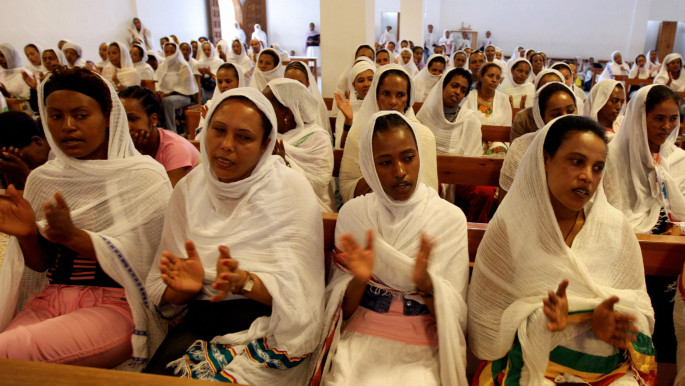Trapped in Lebanon: Fears of abuse for migrant domestic workers amid Covid-19 lockdown
Often deprived of elementary rights and freedom, these women are now at greater risk of being abused while the country is under lockdown to battle the Covid-19 crisis.
Domestic migrant workers in Lebanon are subject to the kafala system, a sponsorship structure that legally binds foreign workers to their local employers.
According to Amnesty International, the migration sponsorship system "increases their risk of suffering labor exploitation, forced labor and trafficking and leaves them with little prospect of obtaining redress".
The exploitative system also allows many employers to abuse their authority, pay less, or not pay at all, abuse, and in some cases, rape and kidnap domestic workers.
And this is just in normal times, let alone amid an economic crisis and the growing spread of the coronavirus pandemic.
"The kafala system is already abusive even without any crisis," Aya Majzoub, Lebanon and Bahrain researcher at Human Rights Watch (HRW), told The New Arab.
 |
|
| Read more: 'We will rise again': Lebanon's revolution is on hold but far from over |
"Before Covid-19, there was already the economic crisis which affected Lebanese employers. We heard reports of workers not being paid or receiving half of their salary, or their full salary but in Lebanese lira, which had much less value once transferred abroad."
For over 20 years, the Lebanese lira has been pegged to the dollar to prevent hyperinflation and economic collapse following the end of the civil war in 1990, with $1 corresponding to a fixed rate of 1,500 lira.
The lira peg has since slipped and the country's supply of dollars has disappeared.
"With the lockdown, many workers are now confined, not able to leave and meet other members of their community, at church or elsewhere," Majzoub added.
"It could be the recipe for more violence because they are now always in contact with their employers, and also a lessened salary. We also wonder about the women sent to walk the dogs or do grocery shopping. Do they have protective gear?"
'This is Lebanon', a group that shares stories of domestic worker abuse in the country, has already received dozens of testimonies.
The group is "on call 24/7 without rest, serving people who are stressed out by the virus and the economic situation," according to the founder Dipendra Uprety.
On their Facebook page, some women have posted comments that paint a picture of their situation, like Delicia Osei, who wrote: "Is very sad.....as for me I don't go out at all, problems every day and now the whole family is in the house am died. I don't rest at all".
 |
The kafala system is already abusive, even without a crisis |  |
Or Grace Abajegekudam, who wrote: "Don't go outside, not allowed to talk to our sisters no day off on Sunday which came once a week, no three Male [meals] per day [..] am angry because I didn't get my monthly payment all because of no dollars and I can't go to the bank today there's Corona virus everything is closed i hope there will be a charge after this virus, so help me God".
"The men are in the house all day now," Uprety told The New Arab. "Imagine being locked up with your abuser. It is bad enough if you have an abusive spouse, but when the abuser is your employer and you are outside your own country with no network and nowhere to go for help, the situation is much, much worse."
Read more: How Covid-19 lockdowns are endangering vulnerable women across the Middle East
With women's shelters and even embassies closed, at least three women reported in the past week that their employer had tried to rape them.
"Who will take them in even if they could escape? It is a disaster," Upretty added. "There is also the problem that many domestic workers do not have health insurance and live in cramped, overcrowded conditions. They are very vulnerable to being infected by the coronavirus and when that happens, it will spread very quickly through the migrant worker communities."
There are currently no flights leaving the country, which means migrant domestic workers are truly stuck in Lebanon.
 |
|
| Read more: Imprisoned, starved, abused: The plight of domestic workers in Lebanon |
Farah Salka, executive director of the local collective Anti-Racism Movement (ARM), talked to The New Arab about another group of domestic workers, not living in homes but employed as freelancers, who often have no legal papers and no health insurance.
"Almost all foreign workers have lost their job, no contract is renewed or pursued and they receive no money in compensation," she said.
Read more: Lebanon hospitals 'discriminating against' undocumented workers seeking vital coronavirus testing
"They're also not able to go back to their country, and are subjected to increased harassment from the authorities when they are outside as there are less people in the streets and they are more noticed," Salka added.
"They are also more at risk because they live in overcrowded places and use public transportation. We know of an Ethiopian woman who was refused a test at a hospital despite her having symptoms and living in an apartment with fourteen other people!"
For the ARM, the solution is to include all people in the government's response to the Covid-19 crisis, and not only Lebanese.
 |
It is bad enough if you have an abusive spouse, but when the abuser is your employer and you are outside your own country with no network and nowhere to go for help, the situation is much, much worse |  |
"The general picture is not good and everyone is affected, Lebanese, refugees, vulnerable, migrants, all suffer and there are not relief efforts," Salka said. "It's just really horrible."
On 6 April, the ARM issued a statement entitled 'Including non-Lebanese in your COVID-19 response plan is not an option, it's a necessity', listing the different set of measures that should be taken to improve general health and situation.
In the longer term, the question of the legal framework surrounding the situation of migrant workers is again at stake. Several organisations, including Human Rights Watch and Amnesty International, are part of a new consultation on the country's kafala sponsorship system since 11 March.
 |
|
| Read more: Besides coronavirus, Lebanon has an equally dangerous outbreak on its hands - unemployment |
The consultation represents a significant opportunity to adopt a revised Standard Unified Contract for the Employment of (Migrant) Domestic Workers, including provisions that address the current inequalities and power imbalance between the employer and the worker.
"We hope this consultation will continue despite the crisis," Majzoub told The New Arab.
In the meantime, it is hard for relief organisations and movements to advise the women contacting them on the best course of action.
For 'This is Lebanon', the outlook is grim. "They are coping because they have to. We are instructing the women writing to us to endure. There is little we can do to help at the moment. Cases of unpaid salaries are on hold till the lockdown is over," the group said.
"The only cases we are acting on are sexual abuse, physical violence and cases where the employers are threatening to toss the girl onto the streets."
The group just hopes that the current situation will highlight furthermore the plight of migrant workers in Lebanon, pushing the government to take action.
Florence Massena is a freelance journalist based in Norway after six years spent in Lebanon. She reports on the environment, women's issues, human rights and refugees in the Middle East, Africa and Europe.
Follow her on Twitter: @FlorenceMassena



